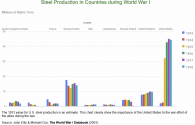A lot of talk about how backwards Imperial Russia was supposed to be is kind of bullshit. A lot of it spread by Soviet Communists.
In 1913 Russia produced as much steel as either France or Austria-Hungary. Steel production in 1913 was 4.9 million tons. With the Russian Civil War steel production totally collapsed. It only recovered the 1913 level in 1930. And Imperial Russia also was a major oil producer.
The country is huge and flat but a huge part of the land area is basically uninhabitable and covered in permafrost.
While I wouldn't diss Stalin's industrialization achievements in the late 1930s if you compare Imperial Russia with the other European powers they weren't as bad economically as people make you think.
In 1913 Russia produced as much steel as either France or Austria-Hungary. Steel production in 1913 was 4.9 million tons. With the Russian Civil War steel production totally collapsed. It only recovered the 1913 level in 1930. And Imperial Russia also was a major oil producer.
The country is huge and flat but a huge part of the land area is basically uninhabitable and covered in permafrost.
While I wouldn't diss Stalin's industrialization achievements in the late 1930s if you compare Imperial Russia with the other European powers they weren't as bad economically as people make you think.

